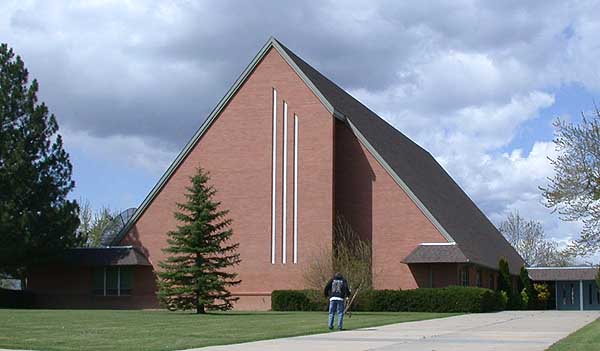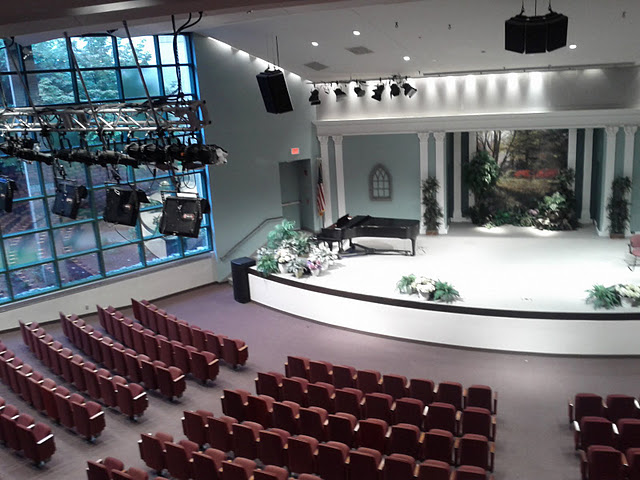|
Adventists
Adventism is a branch of Protestant Christianity that believes in the imminent Second Coming (or the "Second Advent") of Jesus Christ. It originated in the 1830s in the United States during the Second Great Awakening when Baptist preacher William Miller first publicly shared his belief that the Second Coming would occur at some point between 1843 and 1844. His followers became known as Millerites. After Miller's prophecies failed, the Millerite movement split up and was continued by a number of groups that held different doctrines from one another. These groups, stemming from a common Millerite ancestor, became known collectively as the Adventist movement. Although the Adventist churches hold much in common with mainline Christianity, their theologies differ on whether the intermediate state of the dead is unconscious sleep or consciousness, whether the ultimate punishment of the wicked is annihilation or eternal torment, the nature of immortality, whether the wicked are r ... [...More Info...] [...Related Items...] OR: [Wikipedia] [Google] [Baidu] |
Seventh-day Adventist Church
The Seventh-day Adventist Church is an Adventism, Adventist Protestantism, Protestant Christian denomination which is distinguished by its observance of Saturday, the Names of the days of the week#Numbered days of the week, seventh day of the week in the Christian Gregorian calendar, (Gregorian) and the Hebrew calendar, as the Sabbath, and its emphasis on the imminent Second Coming (advent) of Jesus Christ. The denomination grew out of the Millerism, Millerite movement in the United States during the mid-19th century and it was formally established in 1863. Among its co-founders was Ellen G. White, whose extensive writings are still held in high regard by the church. Much of the theology of the Seventh-day Adventist Church corresponds to common Evangelicalism, evangelical Christian teachings, such as the Trinity and the Biblical infallibility, infallibility of Scripture. Distinctive post-tribulation rapture, post-tribulation teachings include the Christian mortalism, unconscio ... [...More Info...] [...Related Items...] OR: [Wikipedia] [Google] [Baidu] |
The 28 Fundamental Beliefs
The Seventh-day Adventist Church is an Adventist Protestant Christian denomination which is distinguished by its observance of Saturday, the seventh day of the week in the Christian (Gregorian) and the Hebrew calendar, as the Sabbath, and its emphasis on the imminent Second Coming (advent) of Jesus Christ. The denomination grew out of the Millerite movement in the United States during the mid-19th century and it was formally established in 1863. Among its co-founders was Ellen G. White, whose extensive writings are still held in high regard by the church. Much of the theology of the Seventh-day Adventist Church corresponds to common evangelical Christian teachings, such as the Trinity and the infallibility of Scripture. Distinctive post-tribulation teachings include the unconscious state of the dead and the doctrine of an investigative judgment. The church places an emphasis on diet and health, including adhering to Kosher food laws, advocating vegetarianism, and ... [...More Info...] [...Related Items...] OR: [Wikipedia] [Google] [Baidu] |
Sabbath In Seventh-day Adventism
The seventh-day Sabbath, observed from Friday evening to Saturday evening, is an important part of the beliefs and practices of seventh-day churches. These churches emphasize biblical references such as the ancient Hebrew practice of beginning a day at sundown, and the Genesis creation narrative wherein an "evening and morning" established a day, predating the giving of the Ten Commandments (thus the command to "remember" the sabbath). They hold that the Old and New Testament show no variation in the doctrine of the Sabbath on the seventh day. Saturday, or the seventh day in the weekly cycle, is the only day in all of scripture designated using the term Sabbath. The seventh day of the week is recognized as Sabbath in many languages, calendars, and doctrines, including those of Catholic, Lutheran, and Orthodox churches. It is still observed in modern Judaism in relation to Mosaic Law. In addition, the Orthodox Tewahedo Churches uphold Sabbatarianism, observing the Sabbath on Satur ... [...More Info...] [...Related Items...] OR: [Wikipedia] [Google] [Baidu] |
General Conference Of Seventh-day Adventists
The General Conference Corporation of Seventh-day Adventists is the governing organization of the Seventh-day Adventist Church. Its headquarters is located in Silver Spring, Maryland and oversees the church in directing its various divisions and leadership, as well as doctrinal matters. The General Conference, which is overseen by an executive committee and an elected President of the General Conference, is the administrative head of the global church. The denomination is organized in a representative form of church government, which means authority arises from the membership of local churches. In addition to administering their own congregations, churches send representatives to vote on matters and leaders in a shared local unit of administration. They vote also on who will represent them in a large area, with further representation selected at each successively larger administrative region. Finally, the General Conference elects the executive committee and officers who hold it ... [...More Info...] [...Related Items...] OR: [Wikipedia] [Google] [Baidu] |
Millerism
The Millerites were the followers of the teachings of William Miller, who in 1831 first shared publicly his belief that the Second Advent of Jesus Christ would occur in roughly the year 1843–1844. Coming during the Second Great Awakening, his teachings were spread widely and grew in popularity, which led to the event known as the Great Disappointment. Origins Miller was a prosperous farmer, a Baptist lay preacher, and student of the Bible living in northeastern New York. He spent years of intensive study of symbolic meaning of the prophecies of Daniel, especially Daniel 8:14 (Unto two thousand and three hundred days; then shall the sanctuary be cleansed), the 2,300-day prophecy. Miller believed that the cleansing of the sanctuary represented the Earth's destruction by fire at Christ's Second Coming. Using the year-day method of prophetic interpretation, Miller became convinced that the 2,300-day period started in 457 BC with the decree to rebuild Jerusalem by Artaxerxes ... [...More Info...] [...Related Items...] OR: [Wikipedia] [Google] [Baidu] |
Branch Davidian
The Branch Davidians (or the General Association of Branch Davidian Seventh-day Adventists) were an apocalyptic new religious movement founded in 1955 by Benjamin Roden. They regard themselves as a continuation of the General Association of Davidian Seventh-Day Adventists, established by Victor Houteff in 1935. Houteff, a Bulgarian immigrant and a Seventh-day Adventist, wrote a series of tracts entitled the "Shepherd's Rod", which called for the reform of the Seventh-day Adventist Church. After his ideas were rejected by Adventist leaders, Houteff and his followers formed the group that later became known as "Davidians" and some of them moved onto a tract of land on the western outskirts of Waco, Texas, United States, where they built a community called the Mount Carmel Center, which served as the headquarters for the movement. After Houteff's death in 1955, his wife Florence took control of the Davidian organization. That same year, Roden (a follower of Houteff), proclaime ... [...More Info...] [...Related Items...] OR: [Wikipedia] [Google] [Baidu] |
Annihilationism
In Christianity, annihilationism (also known as extinctionism or destructionism) is the belief that after the Last Judgment, all unsaved human beings, all fallen angels (all of the damned) and Satan himself will be totally destroyed so as to not exist, or that their consciousness will be extinguished rather than suffer everlasting torment in Hell (often synonymized with the lake of fire). Annihilationism stands in contrast to both belief in eternal torture and suffering in the lake of fire and the belief that everyone will be saved ( universal reconciliation or simply "universalism"). Annihilationism is directly related to the doctrine of Christian conditionalism, the idea that a human soul is not immortal unless it is given eternal life. Annihilationism asserts that God will eventually destroy the wicked, leaving only the righteous to live on in immortality. Thus those who do not repent of their sins are eternally destroyed because of the inherent incompatibility of sin wit ... [...More Info...] [...Related Items...] OR: [Wikipedia] [Google] [Baidu] |
Soul Sleep
Christian mortalism is the Christian belief that the human soul is not naturally immortal and may include the belief that the soul is “sleeping” after death until the Resurrection of the Dead and the Last Judgment, a time known as the intermediate state. "Soul sleep" is often used as a pejorative term, so the more neutral term "mortalism" was also used in the nineteenth century, and "Christian mortalism" since the 1970s. Historically the term psychopannychism was also used, despite problems with the etymology and application. The term thnetopsychism has also been used; for example, Gordon Campbell (2008) identified John Milton as believing in the latter. Soul sleep stands in contrast with the traditional Christian belief that immortal souls immediately go to heaven, hell, or purgatory after death. Soul sleep has been taught by several theologians and church organizations throughout history while also facing opposition from aspects of Christian organized religion. The Cath ... [...More Info...] [...Related Items...] OR: [Wikipedia] [Google] [Baidu] |
Victor Houteff
Victor Tasho Houteff ( Bulgarian; Виктор Ташо Хутев ; March 2, 1885 – February 5, 1955) was the founder of the Davidian Seventh-day Adventist organization, known as The Shepherd's Rod. Early life Houteff was born in Raicovo, Eastern Rumelia, (modern day Bulgaria), and, as a child, baptized as a member of the Bulgarian Orthodox Church. As a young man, he was engaged in the mercantile trade. In 1907, he and his brothers emigrated to the United States after, according to Victor Houteff's testimony, a mob had taken up arms against his family and forced them onto a boat. Houteff would, on several occasions, return to visit his family, many of whom now live in the U.S. Victor Houteff arrived in the U.S. virtually penniless. He soon found work as a hotelier and grocer in the state of Illinois. In 1919, he joined the Seventh-day Adventist Church. In the midst of the Roaring Twenties, Houteff journeyed west to California to be closer to Seventh-day Adventist communiti ... [...More Info...] [...Related Items...] OR: [Wikipedia] [Google] [Baidu] |
Heavenly Sanctuary
In Seventh-day Adventist theology, the heavenly sanctuary teaching asserts that many aspects of the Hebrew tabernacle or sanctuary are representative of heavenly realities. In particular, Jesus is regarded as the High Priest who provides cleansing for human sins by the sacrificial shedding of his blood. The doctrine grew out of the church's interpretation of the 1844 Great Disappointment. As a whole, it is unique to Seventh-day Adventism, although other denominations share many of the typological identifications made by the epistle to the Hebrews, see . One major aspect which is completely unique to Adventism is that the day of atonement is a type or foreshadowing of the investigative judgment. Technically, the "heavenly sanctuary" is an umbrella term which includes the investigative judgment, Christ's ministry in heaven before then, the understanding of , etc. However, it is often spoken of interchangeably with the investigative judgment. The earthly Most Holy Place was entere ... [...More Info...] [...Related Items...] OR: [Wikipedia] [Google] [Baidu] |
Protestant
Protestantism is a Christian denomination, branch of Christianity that follows the theological tenets of the Reformation, Protestant Reformation, a movement that began seeking to reform the Catholic Church from within in the 16th century against what its followers perceived to be growing Criticism of the Catholic Church, errors, abuses, and discrepancies within it. Protestantism emphasizes the Christian believer's justification by God in faith alone (') rather than by a combination of faith with good works as in Catholicism; the teaching that Salvation in Christianity, salvation comes by Grace in Christianity, divine grace or "unmerited favor" only ('); the Universal priesthood, priesthood of all faithful believers in the Church; and the ''sola scriptura'' ("scripture alone") that posits the Bible as the sole infallible source of authority for Christian faith and practice. Most Protestants, with the exception of Anglo-Papalism, reject the Catholic doctrine of papal supremacy, ... [...More Info...] [...Related Items...] OR: [Wikipedia] [Google] [Baidu] |




